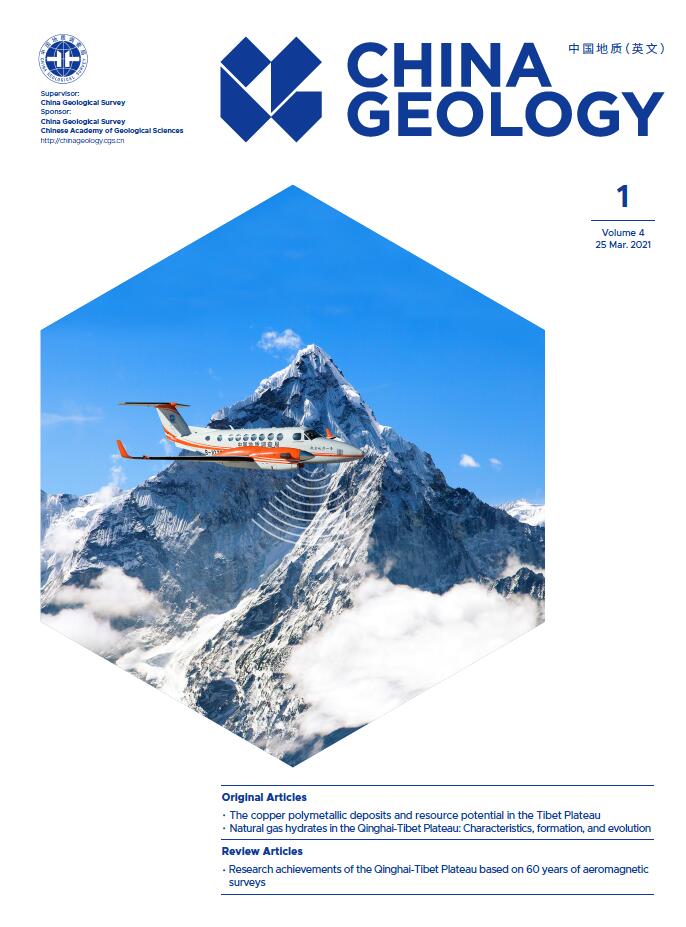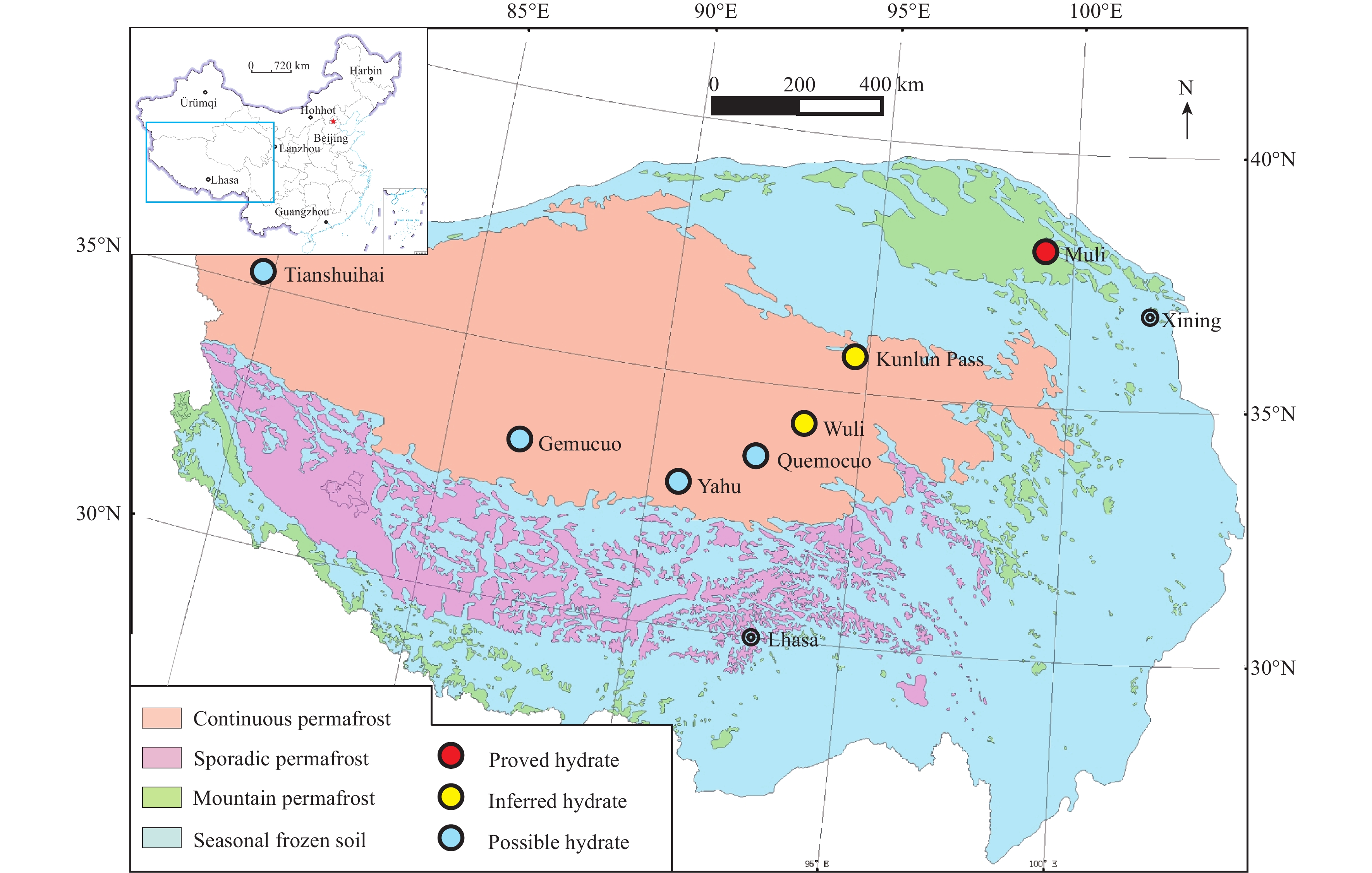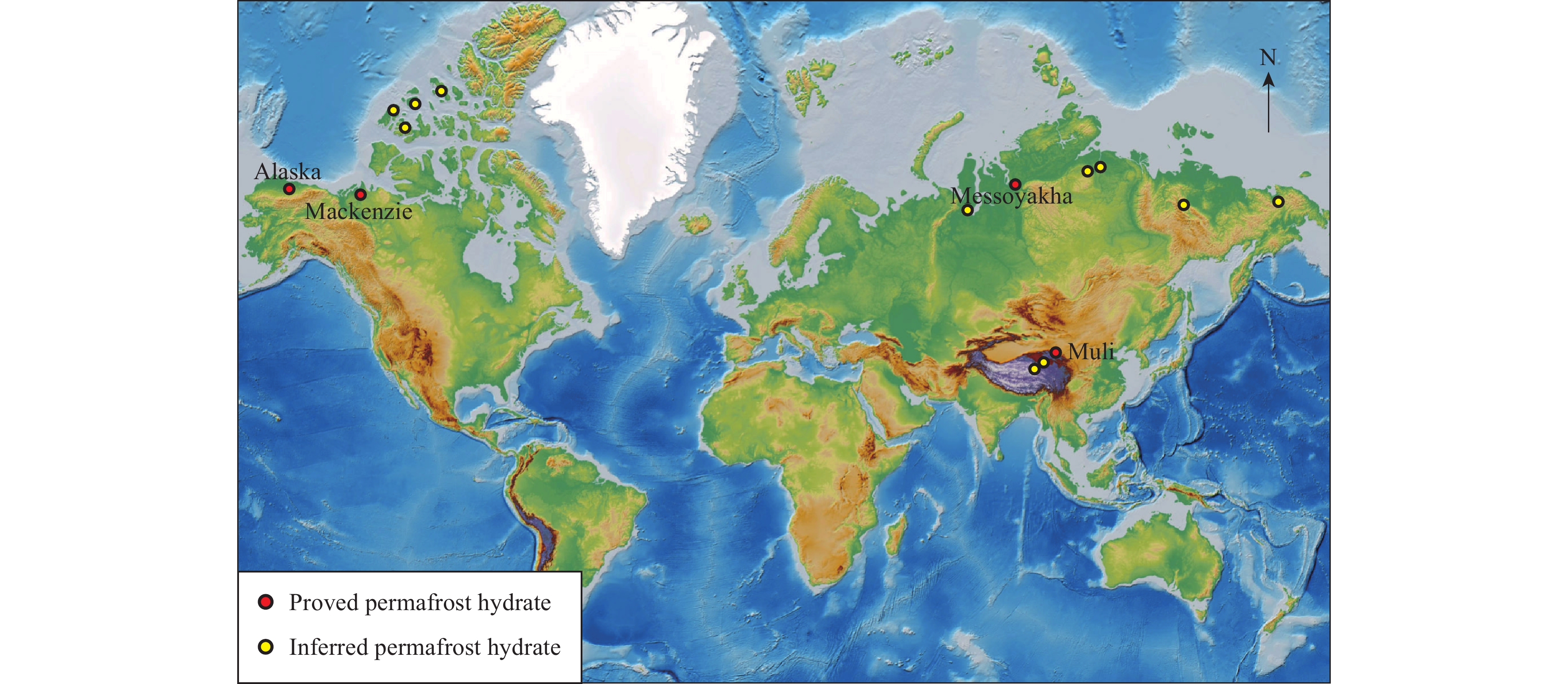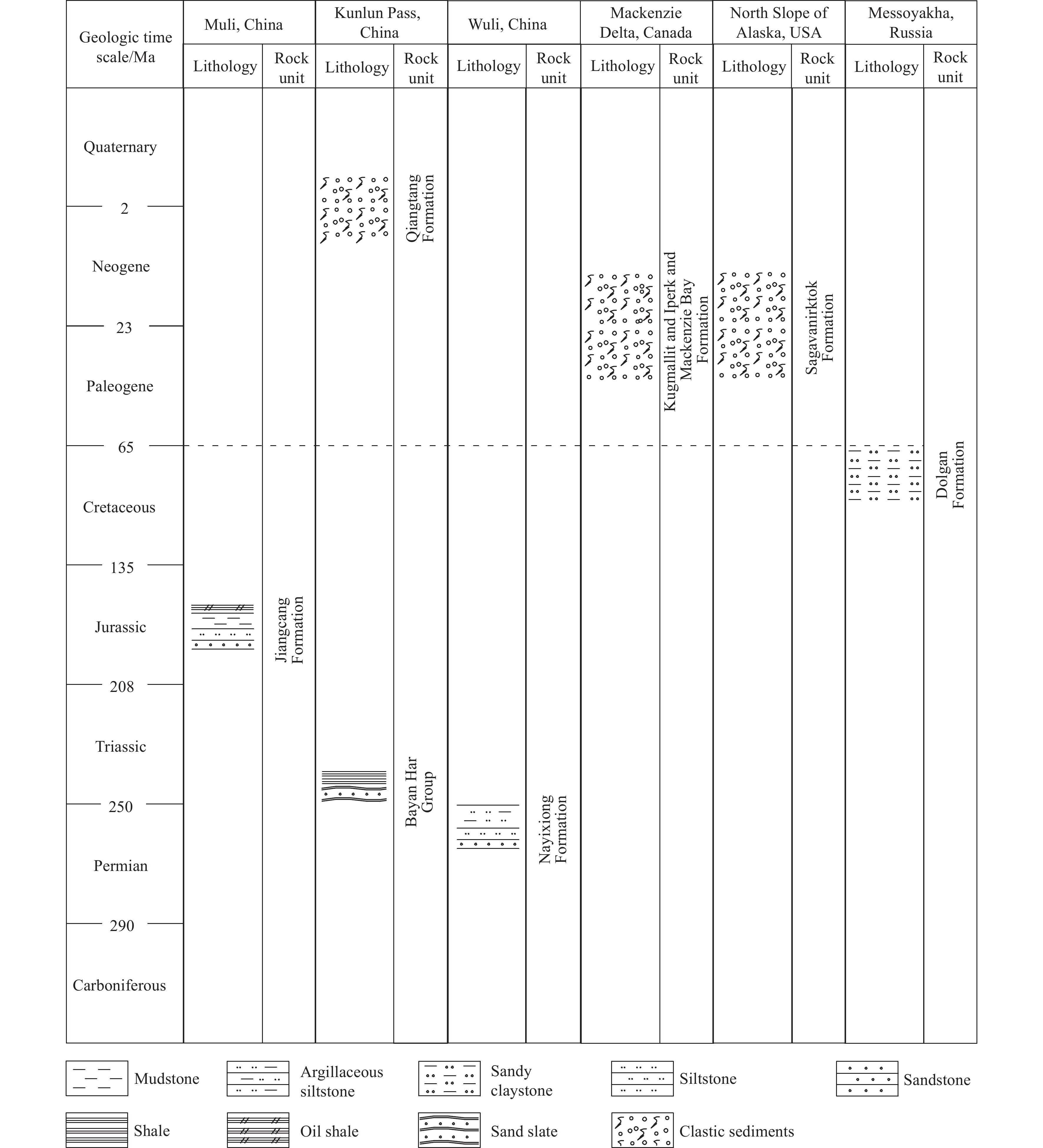| Citation: | You-hai Zhu, Shou-ji Pang, Rui Xiao, Shuai Zhang, Zhen-quan Lu, 2021. Natural gas hydrates in the Qinghai-Xizang Plateau: Characteristics, formation, and evolution, China Geology, 4, 17-31. doi: 10.31035/cg2021025 |
Natural gas hydrates in the Qinghai-Xizang Plateau: Characteristics, formation, and evolution
-
Abstract
The Qinghai-Xizang Plateau (also referred to as the Plateau) is the largest area bearing alpine permafrost region in the world and thus is endowed with great formation conditions and prospecting potential of natural gas hydrates (NGH). Up to now, one NGH accumulation, two inferred NGH accumulations, and a series of NGH-related anomalous indicators have been discovered in the Plateau, with NGH resources predicted to be up to 8.88×1012 m3. The NGH in the Qinghai-Xizang Plateau have complex gas components and are dominated by deep thermogenic gas. They occur in the Permian-Jurassic strata and are subject to thin permafrost and sensitive to environment. Furthermore, they are distinctly different from the NGH in the high-latitude permafrost in the arctic regions and are more different from marine NGH. The formation of the NGH in the Plateau obviously couples with the uplift and permafrost evolution of the Plateau in spatial-temporal terms. The permafrost and NGH in the Qilian Mountains and the main body of the Qinghai-Xizang Plateau possibly formed during 2.0–1.28 Ma BP and about 0.8 Ma BP, respectively. Under the context of global warming, the permafrost in the Qinghai-Xizang Plateau is continually degrading, which will lead to the changes in the stability of NGH. Therefore, The NGH of the Qinghai-Xizang Plateau can not be ignored in the study of the global climate change and ecological environment.
-

-
References
An ZS, Wang SM, Wu XH, Chen MY, Sun DH, Liu XM, Wang FB, Li L, Sun YB, Zhou WJ, Zhou J, Liu XD, Lu HY, Zhang YX, Dong GR, Qiang XK. 1998. Eolian evidence from the Chinese Loess Plateau: The onset of the Late Cenozoic Great Glaciation in the Northern Hemisphere and Qinghai-Xizang Plateau uplift forcing. Science in China (Series D), 42(3), 258–271. doi: 10.1360/zd1998-28-6-481. Chen DF, Wang MC, Xia B. 2005. Formation condition and distribution prediction of gas hydrate in Qinghai-Xizang Plateau permafrost. Chinese Journal of Geophysics, 48(1), 165–172 (in Chinese with English abstract). doi: 10.1002/cjg2.638. Cheng GD, Zhao L, Li R, Wu XD, Sheng Y, Hu GJ, Zou DF, Jin HJ, Li X, Wu QB. 2019. Characteristic, changes and impacts of permafrost on Qinghai-Xizang Plateau. Chinese Science Bulletin, 64(27), 2783–2795. doi: CNKI:SUN:KXTB.0.2019-27-005. Collett TS, Kvenvolden KA, Magoon LB. 1990. Characterization of hydrocarbon gas within the stratigraphic interval of gas-hydrate stability on the North Slope of Alaska, U.S.A. Applied Geochemistry, 5(3), 279–287. doi: 10.1016/0883-2927(90)90003-N. Collett TS, Lee MW, Agena WF, Miller JJ, Lewis KA, Zyrianova MV, Boswell R, Inks TL. 2011. Permafrost-associated natural gas hydrate occurrences on the Alaska North Slope. Marine and Petroleum Geology, 28(2), 279–294. doi: 10.1016/j.marpetgeo.2009.12.001. Dai JX, Ni YY, Huang SP, Peng WL, Han WX, Gong DY, Wei W. 2017. Genetic types of gas hydrates in China. Petroleum Exploration and Development, 44(6), 837–848 (in Chinese with English abstract). doi: 10.11698/PED.2017.06.01. Dai S, Lee C, Santamarina JC. 2011. Formation history and physical properties of sediments from the Mount Elbert Gas Hydrate Stratigraphic Test Well, Alaska North Slope. Marine and Petroleum Geology, 28(2), 427–438. doi: 10.1016/j.marpetgeo.2010.03.005. Dai S, Bao GY, Qi GM, Ma ZL, Bai WR, Yu D, Feng XL, Yang YH, Shi SB. 2019. Impacts of extreme climatic events under the context of climate warming on hydrology and water resources in the Qinghai Qilian Mountains. Journal of Glaciology and Geocryology, 41(5), 1053–1066 (in Chinese with English abstract). doi: 10.7522/j.issn.1000-0240.2019.0901. Dallimore SR, Collett TS. 1999. Regional gas hydrate occurrences, permafrost conditions, and Cenozoic geology, Mackenzie Delta area//Dallimore SR, Uchida T, Collett TS. Scientific Results from JAPEX/JNOC/GSC Mallik 2L-38 Gas hydrate research well, Mackenzie Delta, Northwest Territories, Canada. Bulletin of the Geological Survey of Canada, 544, 31–43. Dickens GR, Castillo MM, Walker JC. 1997. A blast of gas in the latest Paleocene: Simulating first-order effect of massive dissociation of oceanic methane hydrate. Geology, 25, 259–262. doi: 10.1130/0091-7613(1997)025<0259:ABOGIT>2.3.CO;2. Ge XH, Liu JL, Ren SM, Yuan SH. 2014. Tectonic uplift of the Xizang Plateau: Impacts on the formation of landforms, climate changes and ancient human migration in China. Geology in China, 41(3), 698–714 (in Chinese with English abstract). Gong JM, Zhang J, Chen XH, Liao J, Li XY, He XL, Jiang YB. 2014. Gas hydrate accumulation conditions between Qilian Mountain and Wuli permafrost region in Qinghai-Xizang Plateau. Journal of Oil and Gas Technology, 36(2), 1–5 (in Chinese with English abstract). doi: 10.3969/j.issn.1000-9752.2014.02.001. Jiao SH, Wang LY, Liu GN. 2016. Prediction of Xizang Plateau permafrost distribution in global warming. Acta Scientiarum Naturalium Universitatis Pekinensis, 52(2), 249–256 (in Chinese with English abstract). doi: 10.13209/j.0479-8023.2015.112. Jiao SH, Wang LY, Sun CQ, Yi ZL, Cui ZJ, Liu GN. 2015. Discussion about the variation of permafrost boundary in last glacial maximum and Holocene megathermal, Xizang plateau. Quaternary Sciences, 35(1), 1–11 (in Chinese with English abstract). doi: 10.11928/j.issn.1001-7410.2015.01.01. Jin HJ, Jin XY, He RX, Luo DL, Chang XL, Wang SL, Smarchenko S, Yang SZ, Yi ZL, Li SJ, Aharris S. 2019. Evolution of permafrost in China during the last 20 ka. Science China Earth Sciences, 62, 1197–1212. doi: 10.1360/N072018-00035. Kennett JP, Cannariato KG, Hendy IL, Behl RJ. 2000. Carbon isotopic evidence for methane hydrate instability during Quaternary interstadials. Science, 288, 128–133. doi: 10.1126/science.288.5463.128. Kneafsey TJ, Lu H, Winters W, Boswell R, Hunter R, Collett TS. 2011. Examination of core samples from the Mount Elbert gas hydrate stratigraphic test well, Alaska North Slope: Effects of retrieval and preservation. Marine and Petroleum Geology, 28(2), 381–393. doi: 10.1016/j.marpetgeo.2009.10.009. Kretschmer K, Biastoch A, Rüpke L, Burwicz E. 2015. Modeling the fate of methane hydrates under global warming. Global Biogeochemical Cycles, 29(5), 610–625. doi: 10.1002/2014GB005011. Ku XB, Wu QB, Jiang GL. 2007. Potential distribution of natural gas hydrate in the permafrost regions of Qinghai-Xizang Plateau. Natural Gas Industry, 18(4), 588–592 (in Chinese with English abstract). doi: 10.3969/j.issn.1672-1926.2007.04.022. Kvenvolden KA. 1988. Methane hydrate–a major reservoir of carbon in the shallow geosphere? Chemical Geology, 71, 41–51. doi: 10.1016/0009-2541(88)90104-0. Kvenvolden KA. 1993. Gas hydrates-geological perspective and global change. Chemical Geology, 31(2), 173–187. doi: 10.1029/93RG00268. Li B, Sun YH, Guo W, Shan XL, Wang PK, Pang SJ, Jia R, Zhang GB. 2017. The mechanism and verification analysis of permafrost- associated gas hydrate formation in the Qilian Mountain, Northwest China. Marine and Petroleum Geology, 86, 787–197. doi: 10.1016/j.marpetgeo.2017.05.036. Li JJ. 2013. Uplift of the Qinghai-Xizang Plateau and environmental evolution of late Cenozoic. Journal of Lanzhou University (Natural Science), 49(2), 154–159 (in Chinese with English abstract). doi: 10.3969/j.issn.0455-2059.2013.02.002. Li QL, Wang XW. 2003. Quaternary environmental changes in western Qilian Mountains, Gansu. Sedimentary Geology and Tethyan Geology, 23(2), 43–47 (in Chinese with English abstract). doi: 10.3969/j.issn.1009-3850.2003.02.008. Li SX, Cheng GD. 1996. The analysis and approximate calculation of permafrost evolution. Journal of Glaciology and Geocryology, 18(Special issue), 197–205 (in Chinese with English abstract). doi: CNKI:SUN:BCDT.0.1996-S1-023. Li X, Cheng GD. 1999. Response model of globle clmate change in the high-elevation permafrost. Science China Earth Science, 29(2), 185–192. doi: 10.3321/j.issn:1006-9267.1999.02.011. Liu GY, Zhao L, Xie CW, Pang QQ, Du RJ, Qiao YP. 2016. Variation characteristics and impact factors of the depth of zero annual amplitude of ground temperature in permafrost regions on the Xizang Plateau. Journal of Glaciology and Geocryology, 38(5), 1189–1200 (in Chinese with English abstract). doi: 10.7522/j.issn.1000-0240.2016.0139. Liu H, Zhu YH, Pang SJ, Zhang YQ, Liang J, Zhang JZ. 2019. Important evidence for gas hydrate occurrence in Wuli, Qinghai Province. Geology in China, 46(5), 1243–1244 (in Chinese with English abstract). doi: CNKI:SUN:DIZI.0.2019-05-027. Lorenson TD, Collett TS, Hunter RB. 2011. Gas geochemistry of the Mount Elbert gas hydrate stratigraphic test well, Alaska North Slope: implications for gas hydrate exploration in the arctic. Marine and Petroleum Geology, 2011, 343–360. doi: 10.1016/j.marpetgeo.2010.02.007. Lorenson TD, Whiticar MJ, Waseda A. 1999. Gas composition and isotopic geochemistry of cuttings, core, and gas hydrate from the JAPEX/JNOC/GSC Mallik 2L-38 gas hydrate research well//Dallimore SR, Uchida T, Collett TS. Scientific Results from JAPEX/JNOC/GSC Mallik 2L-38 Gas Hydrate Research Well, Mackenzie Delta, Northwest Territories, Canada. Bulletin of the Geological Survey of Canada, 544, 143–163. Lu J, Chen MH. 2006. Global climate events since Cenozoic. Journal of Tropical Oceanography, 25(6), 72–79 (in Chinese with English abstract). doi: 10.3969/j.issn.1009-5470.2006.06.013. Lu ZQ, Zhai GY, Zhu YH, Liu H, Wang T, Fang H, Sun ZJ, Tang SQ, Zhang YQ. 2018. New discovery of the permafrost gas hydrate accumulation in Qilian Mountain, China. China Geology, 1, 306–307. doi: 10.31035/cg2018034. Lu ZQ, Tang SQ, Luo XL, Zhai GY, Fan DW, Liu H, Wang T, Zhu YH, Xiao R. 2020. A natural gas hydrate-oil-gas system in the Qilian Mountain permafrost area, northeast of Qinghai-Xizang Plateau. China Geology, 3, 511–523. doi: 10.31035/cg2020075. Lu ZQ, Zhu YH, Zhang YQ, Wen HJ, Li YH, Liu CL. 2011. Gas hydrate occurrences in the Qilian Mountain permafrost, Qinghai Province, China. Cold Regions Science and Technology, 66(2–3), 93–104. doi: 10.1016/j.coldregions.2011.01.008. Luo DL, Jin HJ, Lin L, He RX, Yang SZ, Chang XL. 2012, New progress on permafrost temperature and thickness in the source area of the Huanghe River. Scientia Geographica Sinica, 32(7), 898–904 (in Chinese with English abstract). http://ir.casnw.net/handle/362004/8861 Majorowicz JA, Osadetz K. 2001. Basic geological and geophysical indications of gas hydrate distribution and volume in Canada. American Association of Petroleum Geologists Bulletin, 85, 1211–1230. Majorowicz JA, Hannigan PK. 2000. Natural gas hydrates in the offshore Beaufort-Mackenzie basin–study of a feasible energy source. Natural Resources Research, 9(3), 201–214. doi: 10.1023/A:1010179301059. Makogon YF, Holditch SA, Makogon TY. 2007. Natural gas-hydrates–a potential energy source for the 21st Century. Journal of Petroleum Science and Engineering, 56(1–3), 14–31. doi: 10.1016/j.petrol.2005.10.009. Mestdagha T, Poortb J, De Batista M. 2017. The sensitivity of gas hydrate reservoirs to climate change: Perspectives from a new combined model for permafrost-related and marine settings. Earth-Science Reviews, 169, 104–131. doi: 10.1016/j.earscirev.2017.04.013. Milkov AV. 2004. Global estimates of hydrate-bound gas in marine sediments, how much is really out there? Earth-Science Reviews, 66(3–4), 183–197. doi: 10.1016/j.earscirev.2003.11.002. Pan BT, Li JJ, Zhu JJ, Cao JX. 1995. Qinghai-Xizang Plateau: A driver and amplifier of the global climatic changes – II. Uplift Progresses of the Qinghai-Xizang Plateau. Journal of Lanzhou University (Natural Science), 31(4), 160–167 (in Chinese with English abstract). doi: CNKI:SUN:LDZK.0.1995-04-029. Qi BS, Hu DG, Zhao XT, Zhang XJ, Zhang YL, Yang XX, Zhao Z, Gao XM. 2014. Fossil sand wedges in the northern shore of Qinghai Lake: Discovery and paleoclimatic implications. Journal of Glaciology and Geocryology, 36(6), 1412–1419 (in Chinese with English abstract). doi: 10.7522/j.issn.1000-0240.2014.0168. Qiao YC, Zhao GP, Shi YL, Liu TQ. 2010. Numerical simulation of influence of the Qinghai-Xizang Plateau rising rates on formation of Permafrost. Acta Geologica Sinica, 84(6), 901–908 (in Chinese with English abstract). doi: CNKI:SUN:DZXE.0.2010-06-016. Ruppel C. 2015. Permafrost-associated gas hydrate: Is it really approximately 1% of the global system? Journal of Chemical and Engineering Data, 60(2), 429–436. doi: 10.1021/je500770m. Shi YF, Li JJ, Li BY, Yao TD, Wang SM, Li SJ, Cui ZJ, Wang FB, Pan BT, Fang XM, Zhang QS. 1999. Uplift of the Qinghai-Xizang Plateau and East Asia environmental changes during late Cenozoic. Acta Geographica Sinica, 54(1), 10–21. doi: 10.3321/j.issn:0375-5444.1999.01.002. Shi YF, Zheng BX, Yao TD. 1997. Glaciers and environments during the Last Glacial Maximum (LGM) on the Xizang Plateau. Journal of Glaciology and Geocryology, 19, 97–113 (in Chinese with English abstract). doi: CNKI:SUN:BCDT.0.1997-02-000. Wang PK, Zhu YH, Lu ZQ, Bai MG, Huang X, Pang SJ, Zhang S, Liu H, Xiao R. 2019. Research progress of gas hydrates in the Qilian Mountain permafrost, Qinghai, Northwest China: Review. Scientia Sinica Physica, Mechanica & Astronomica, 49(3), 034606 (in Chinese with English abstract). doi: 10.1360/SSPMA2018-00133. Wang X, Pan L, Lau HC, Zhang M, Li LL, Zhou Q. 2018. Reservoir volume of gas hydrate stability zones in permafrost regions of China. Applied Energy, 225, 486–500. doi: 10.1016/j.apenergy.2018.04.125. Wu QB, Jiang GL, Zhang P, Deng YS, Yang YZ, Hou YD, Zhang BG. 2015. Evidence of natural gas hydrate in Kunlun Pass basin, Qinghai-Xizang Plateau, China. Chinese Science Bulletin, 60, 68–74 (in Chinese with English abstract). doi: 10.1360/n972014-00088. Xiao HP, Wu QB, Lin CS, Wei W, Zhang JH, Peng Y, Zhang P, Zhang QZ. 2016. Preliminary discussion on the space-time coupling of natural gas hydrate accumulation elements: A case study from Kunlun Pass permafrost regions, Qinghai-Xizang Plateau. Natural Gas Geoscience, 27(10), 1913–1923 (in Chinese with English abstract). doi: 10.11764/j.issn.1672-1926.2016.10.1913. Xu XZ, Cheng GD, Yu QH. 1999. Research prospect and suggestions of gas hydrates in permafrost regions on the Qinghai-Xizang Plateau. Advances in Earth Science, 14(2), 201–204 (in Chinese with English abstract). doi: 10.3321/j.issn:1001-8166.1999.02.018. Yao TD. 2019. A comprehensive study of water-ecosystem-human activities reveals unbalancing Asian Water Tower and accompanying potential risks. Chinese Science Bulletin, 64(27), 2761–2762 (in Chinese with English abstract). doi: CNKI:SUN:KXTB.0.2019-27-001. Zhao XM, Song FY, Deng J, Rao Z, Wen ZG, Hu DG, Yi L, Liu C. 2018. New indications of gas hydrate in the northeastern China permafrost zone. China Geology, 1, 308–309. doi: 10.31035/cg2018033. Zhang JH, Wei W, Wei XH, Xiao HP, Peng Y, Zhang QQ, Wang P. 2016. Formation conditions of natural gas hydrates in Kunlun Mountain Pass Basin. Unconventional Oil & Gas, 3(3), 101–105 (in Chinese with English abstract). doi: CNKI:SUN:FCYQ.0.2016-03-018. Zhang WJ, Cheng WM, Li BL, Tong CM, Zhao M, Wang N. 2014. Simulation of the permafrost distribution on Qilian Mountains over past 40 years under the influence of climate change. Geographical Research, 33(7), 1275–1284 (in Chinese with English abstract). doi: 10.11821/dlyj201407008. Zhong DB, Ding L. 1996. Rising process of the Qinghai-Xizang Plateau and its mechanism. Science in China (Series D), 39(4), 369–379. doi: CNKI:SUN:JDXG.0.1996-04-003. Zheng D, Lin ZY, Zhang XQ. 2002. Progress in studies of Xizang plateau and global environmental change. Earth Science Frontiers, 9(1), 95–102 (in Chinese with English abstract). doi: 10.3321/j.issn:1005-2321.2002.01.012. Zhou Q, Li WL, Chen WT, Wang YJ. 2011. Spatial coupling relationships about formation of gas hydrate in Xizang Plateau. Journal of Glaciology and Geocryology, 33(5), 1139–1145 (in Chinese with English abstract). doi: CNKI:SUN:BCDT.0.2011-05-025. Zhou SZ, Li JJ. 2003. Recent progress in the study on Quaternary glaciation in China. Journal of Glaciology and Geocryology, 25(6), 660–666 (in Chinese with English abstract). doi: 10.3969/j.issn.1000-0240.2003.06.011. Zhou YW, Guo DX, Qiu GQ, Cheng GD, Li SD. 2000. Geocryology in China. Beijing, Science Press, 1−245 (in Chinese). https://doi.org/10.2307/1552227 Zhu YH, Zhang YQ, Wen HJ, Jia ZY, LI YH, LI QH, Liu CL, Wang PK, Guo XW. 2010. Gas hydrates in the Qilian Mountain permafrost, Qinghai, Northwest China. Acta Geologica Sinica (English Edition), 84(1), 1–10. doi: 10.1111/j.1755-6724.2010.00164.x. Zhu YH, Zhao SM, Lu ZQ. 2011. Resource potential and reservoir distribution of natural gas hydrate in permafrost areas of China. Natural Gas Industry, 31(1), 13–19 (in Chinese with English abstract). doi: 10.3787/j.issn.1000-0976.2011.01.003. -
Access History

-
Figure 1.
Distribution of NGH in the Qinghai-Xizang Plateau.
-
Figure 2.
Photos of drilling site and NGH burning in the Muli area of South Qilian Basin.
-
Figure 3.
Distribution of global NGH in permafrost.
-
Figure 4.
Gas source types of global NGH in permafrost (the data of Kunlun Pass Basin from Wu QB et al., 2015; data of Alaska from Collett TS et al., 1990 and Lorenson TD et al., 2011).
-
Figure 5.
Comparison among global NGH reservoirs in permafrost regions.
-
Figure 6.
Illustration of the uplift of the Qinghai-Xizang Plateau and the formation of the permafrost and NGH in the Qinghai-Xizang Plateau (the data on uplift and permafrost formation modified from Shi YF et al., 1999).
-
Figure 7.
Change of NGH stability zone in the Muli area during the LGM, the HMP, the present and 2099.





 DownLoad:
DownLoad:





